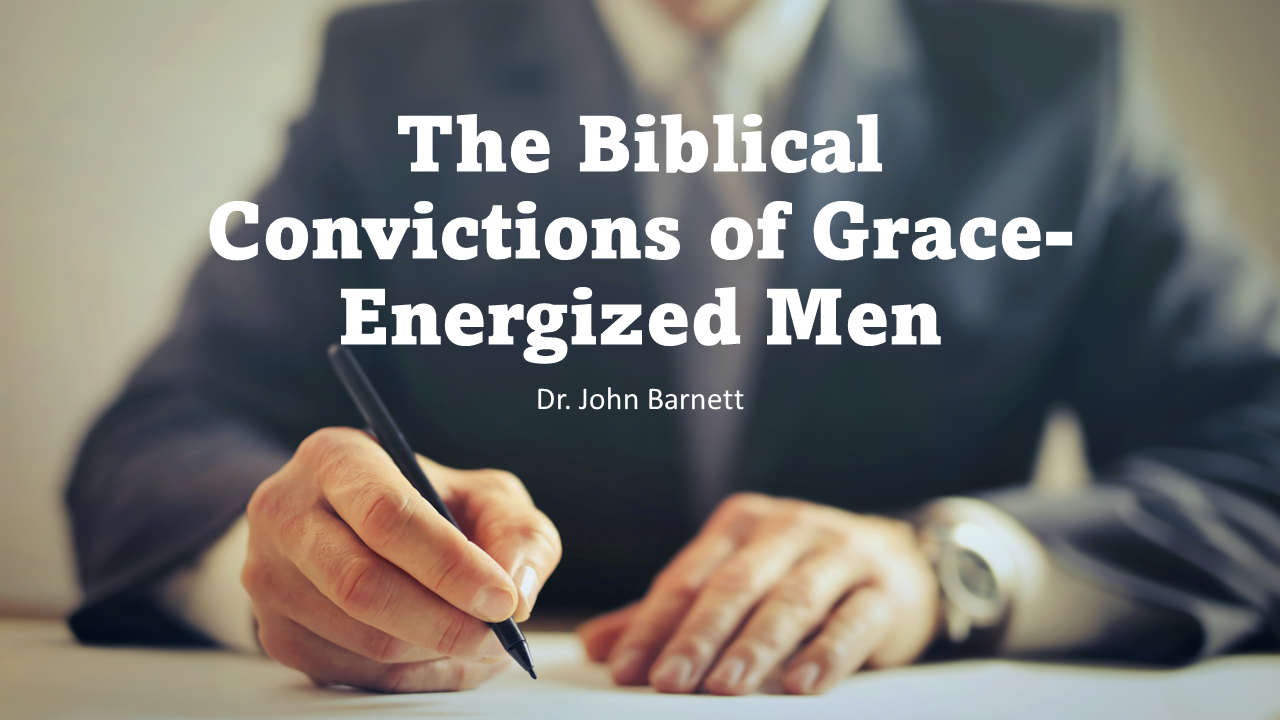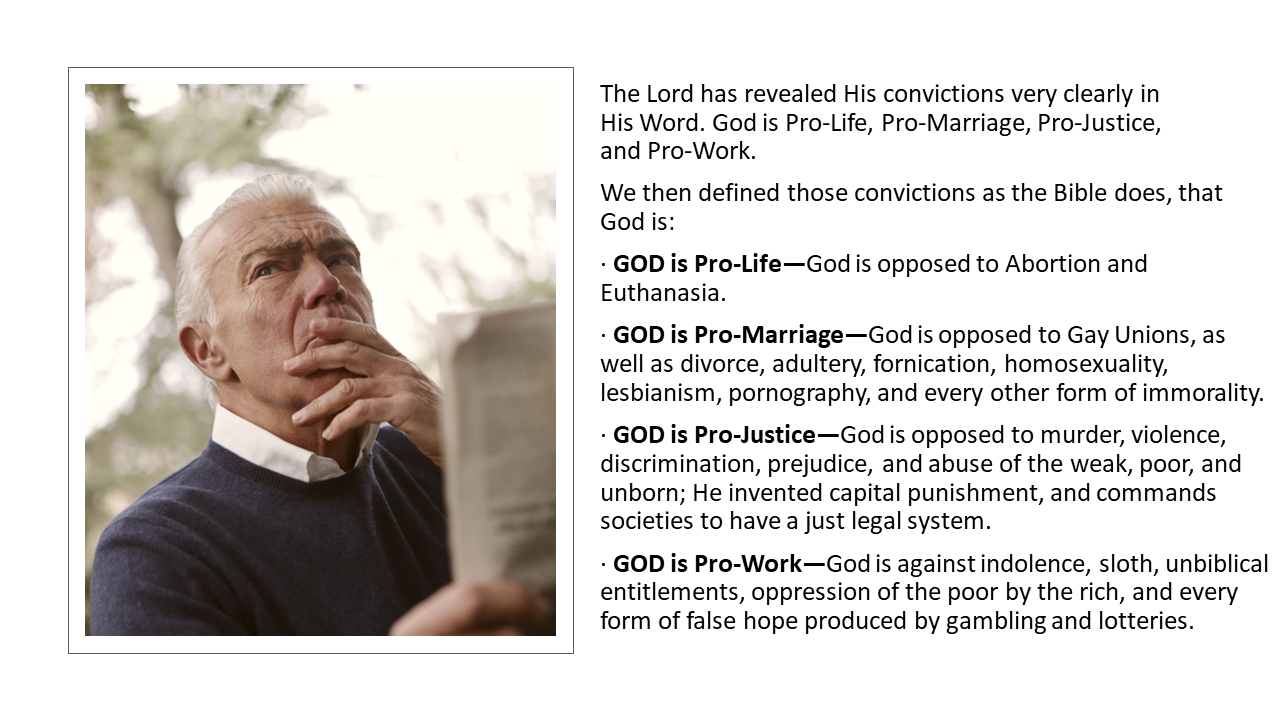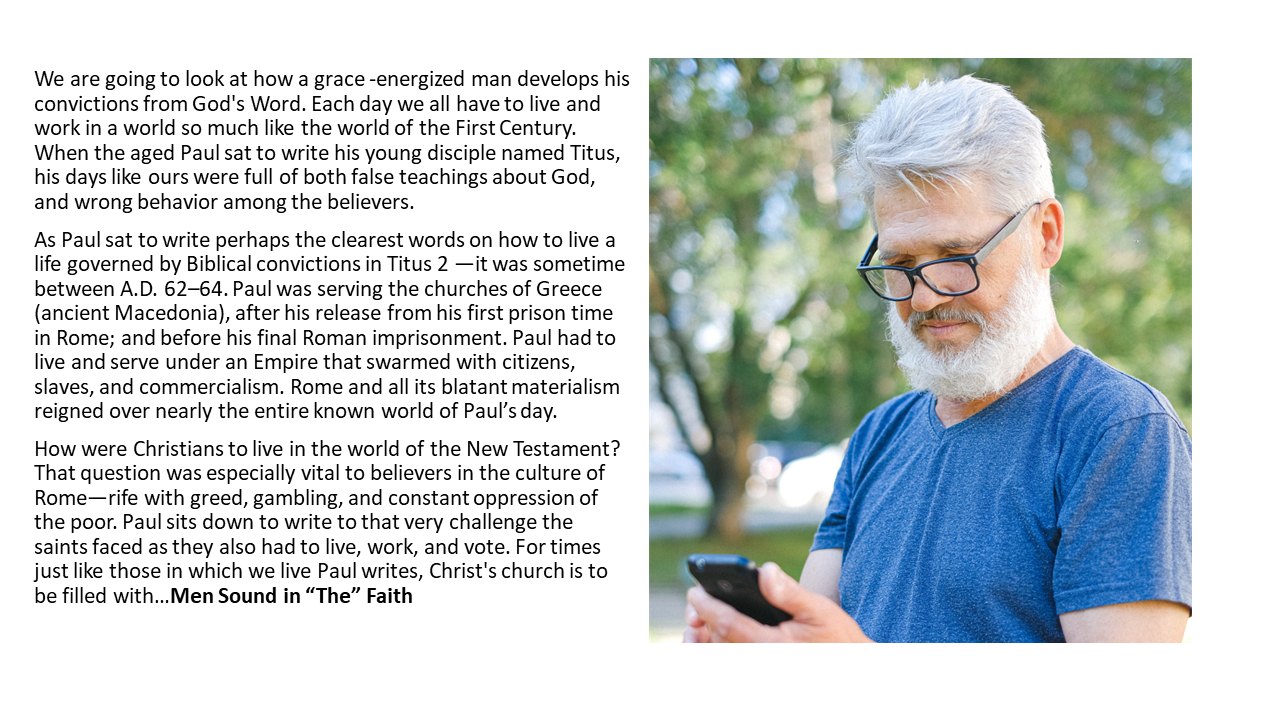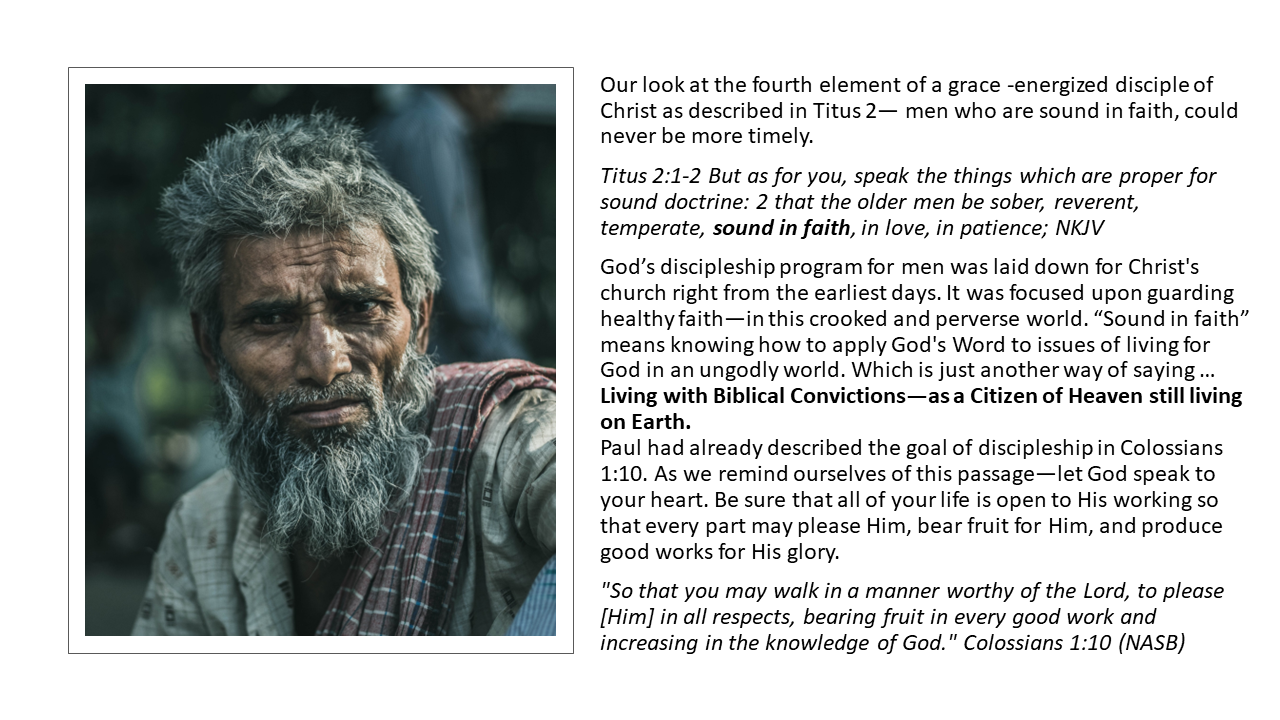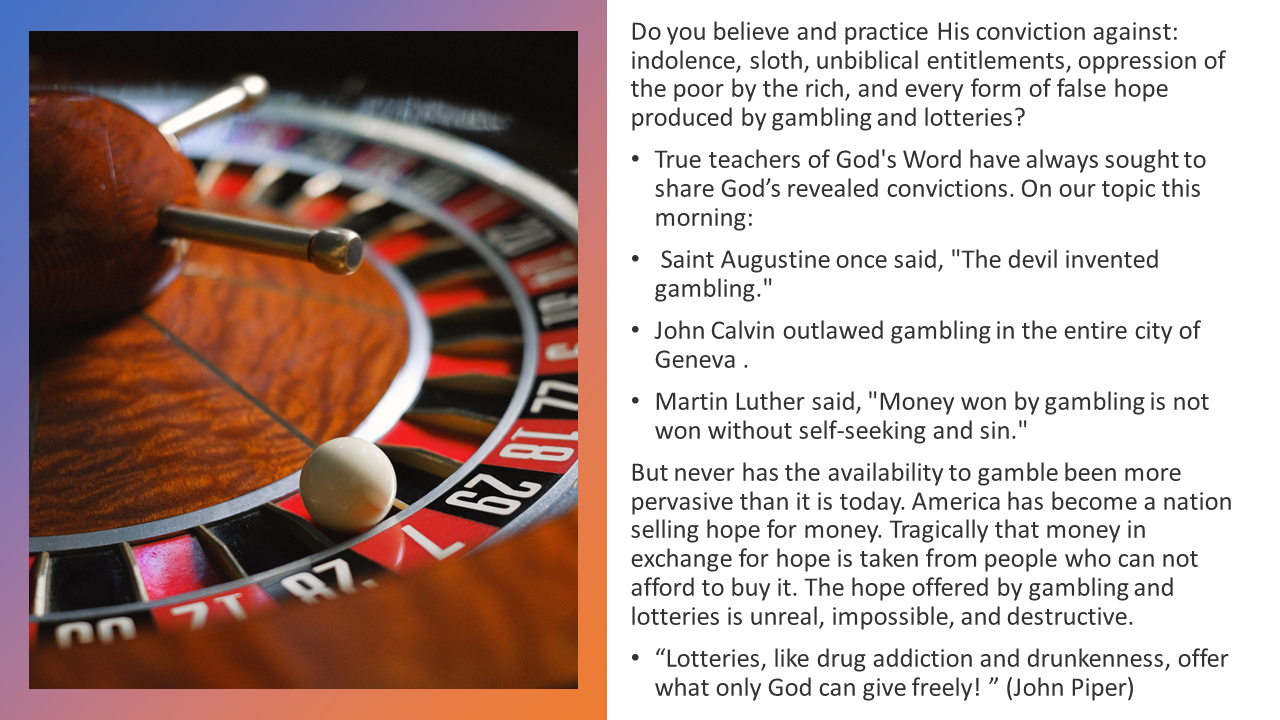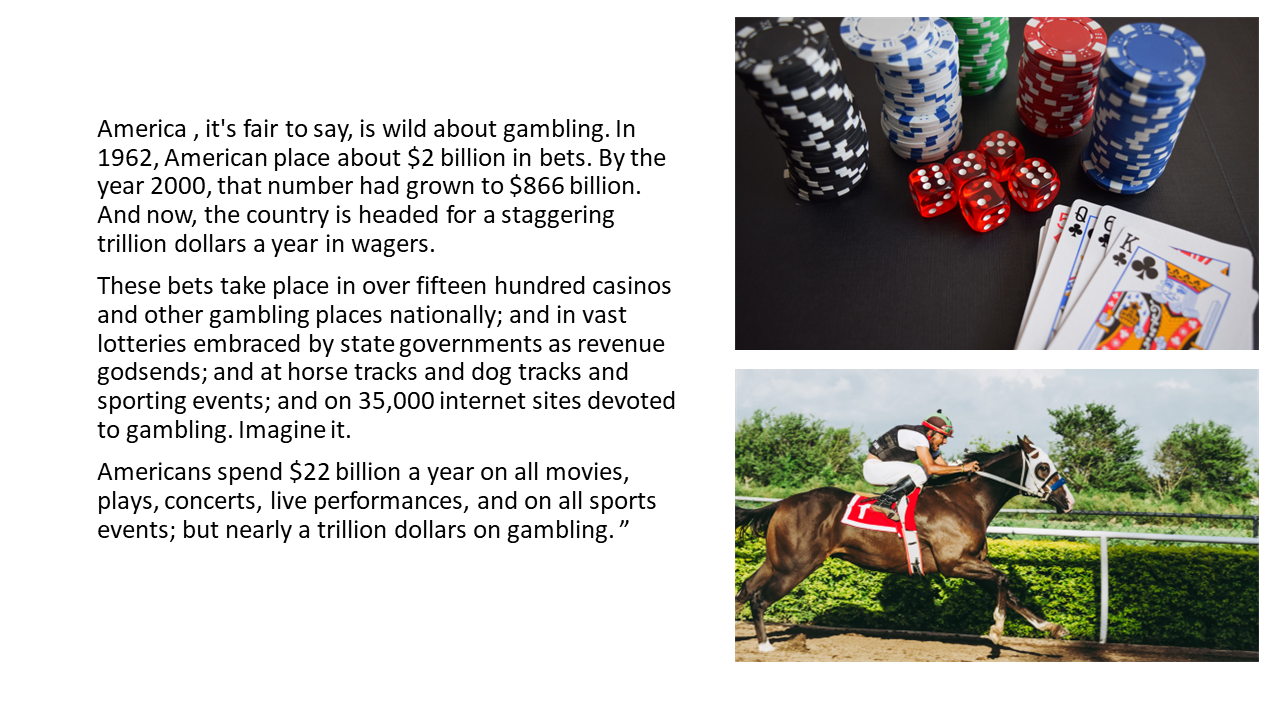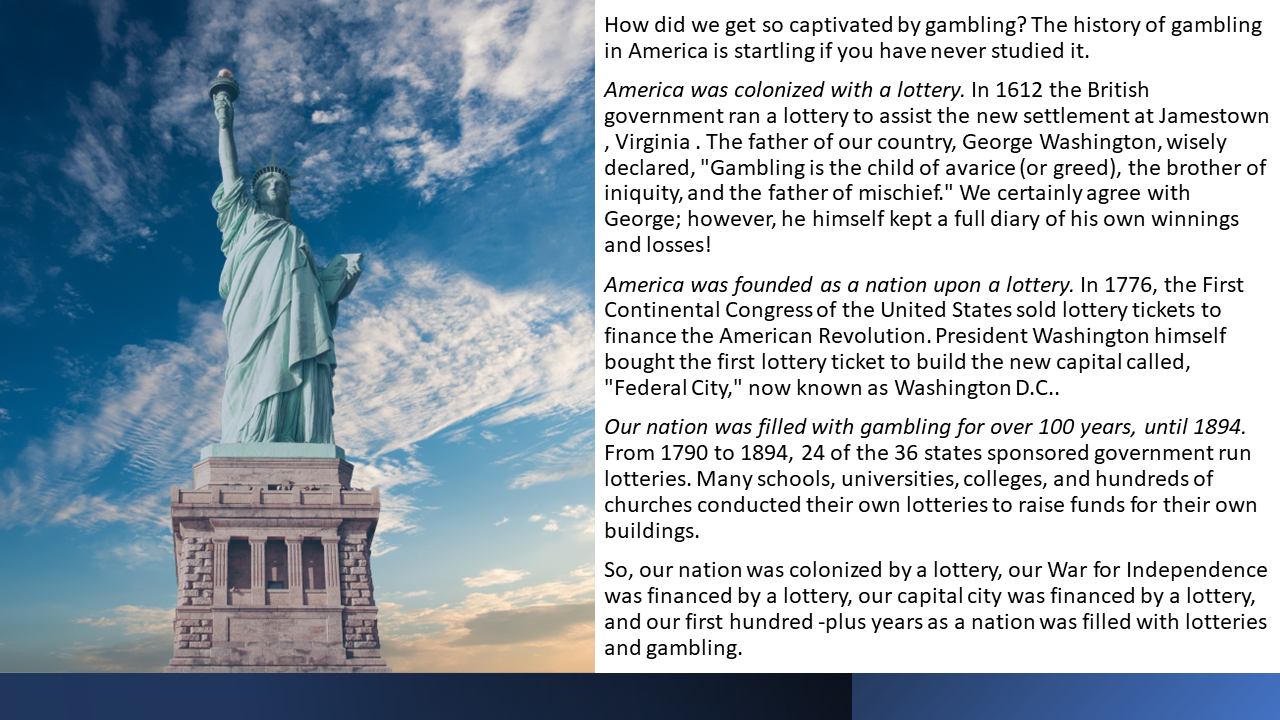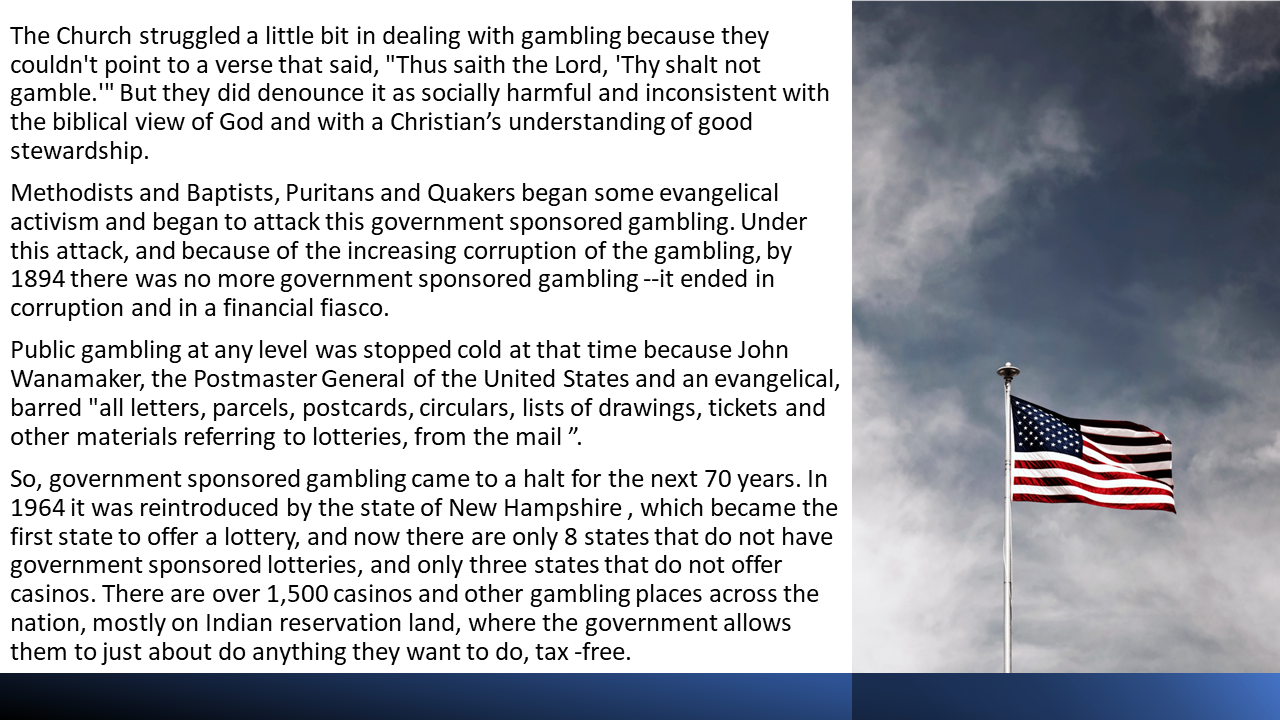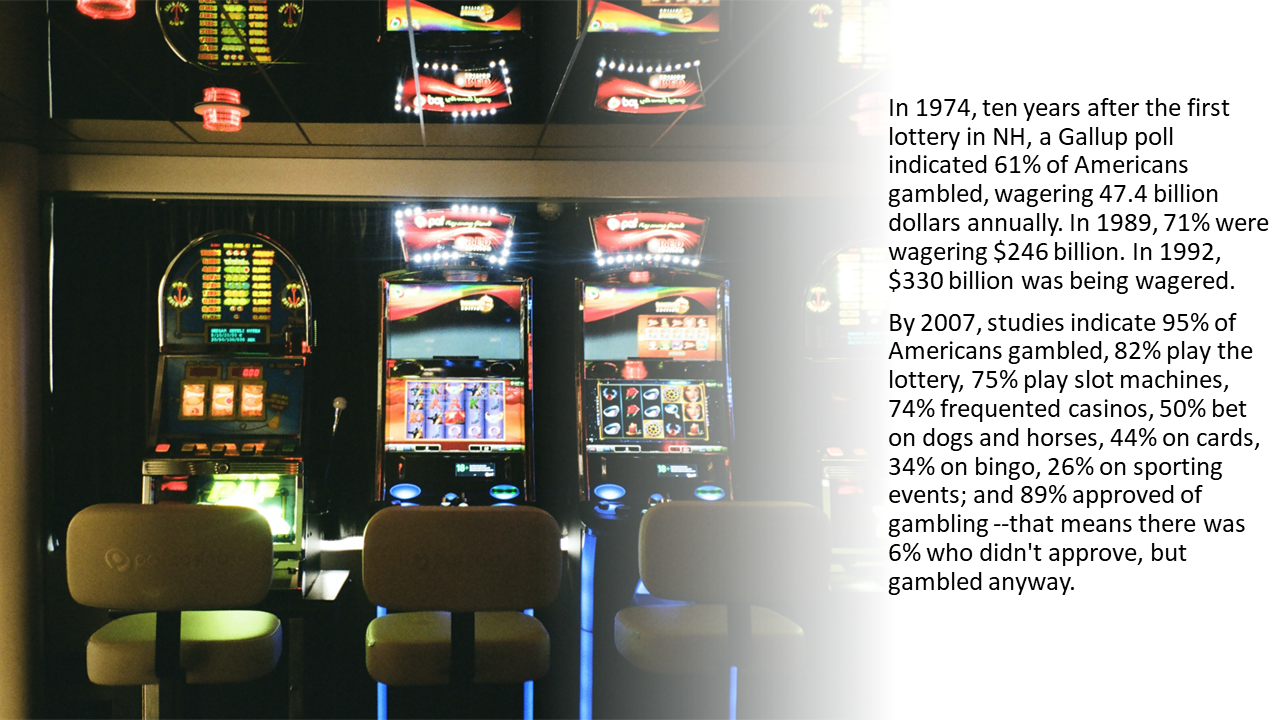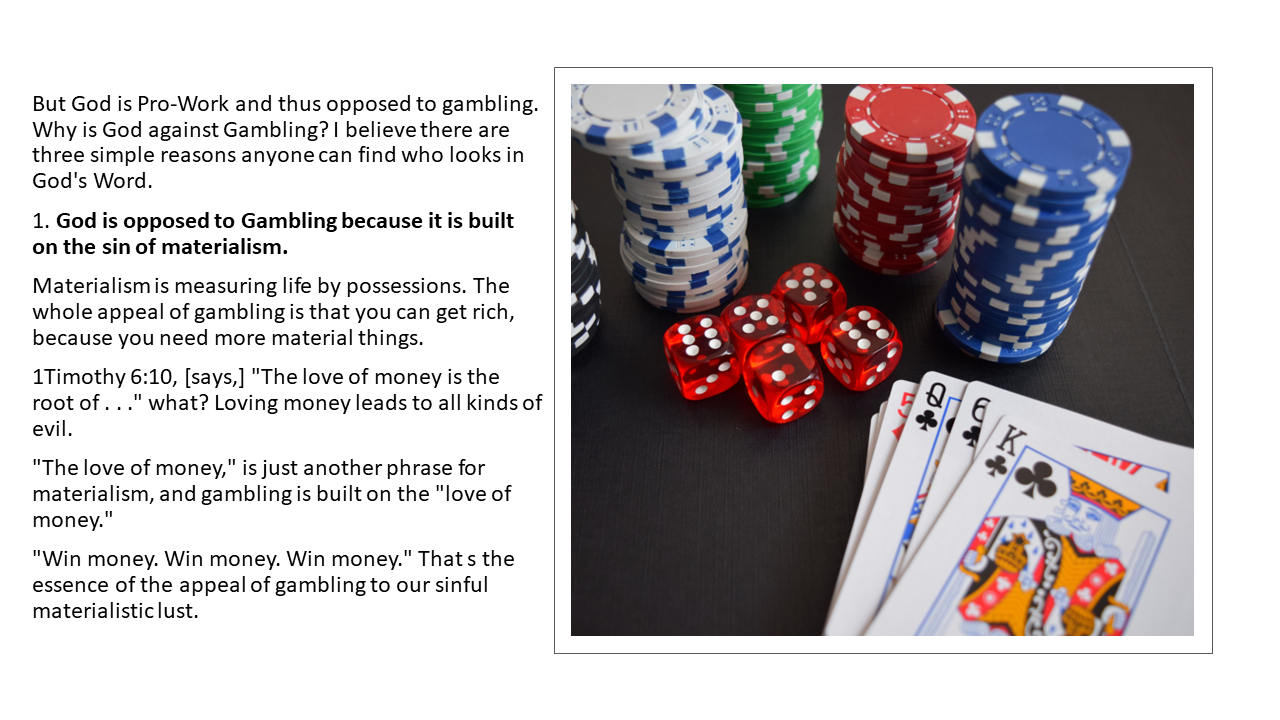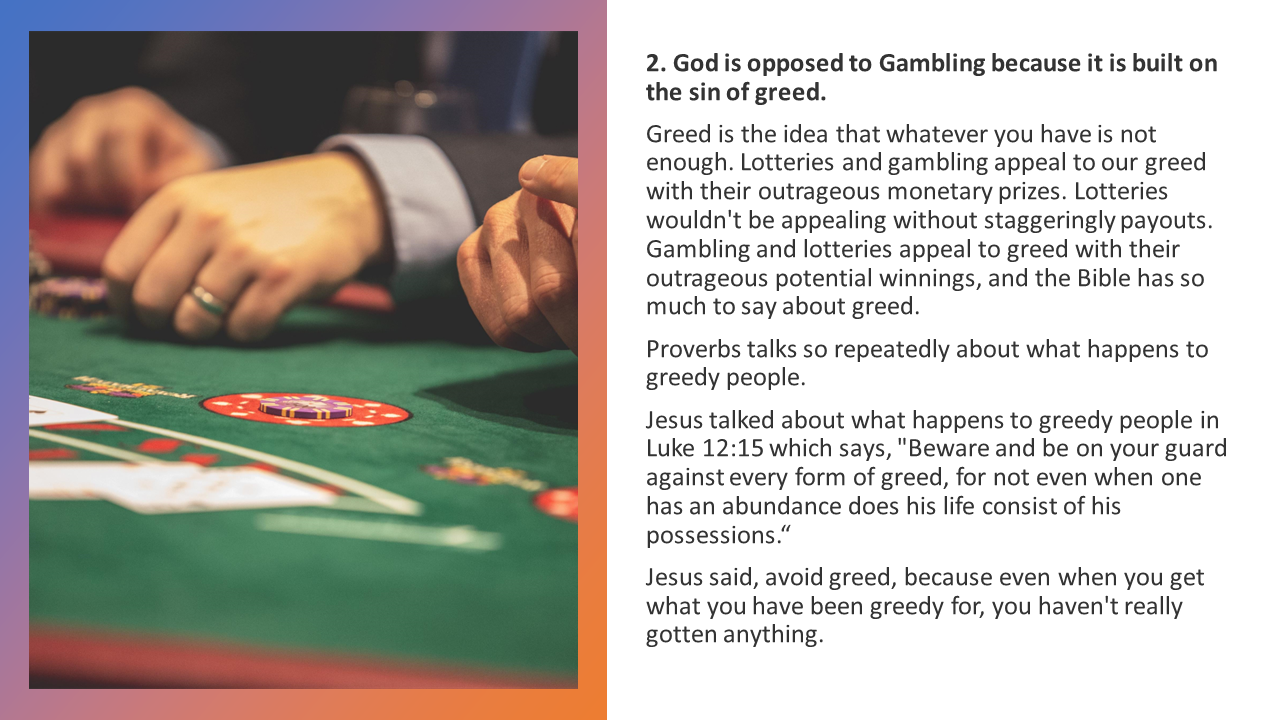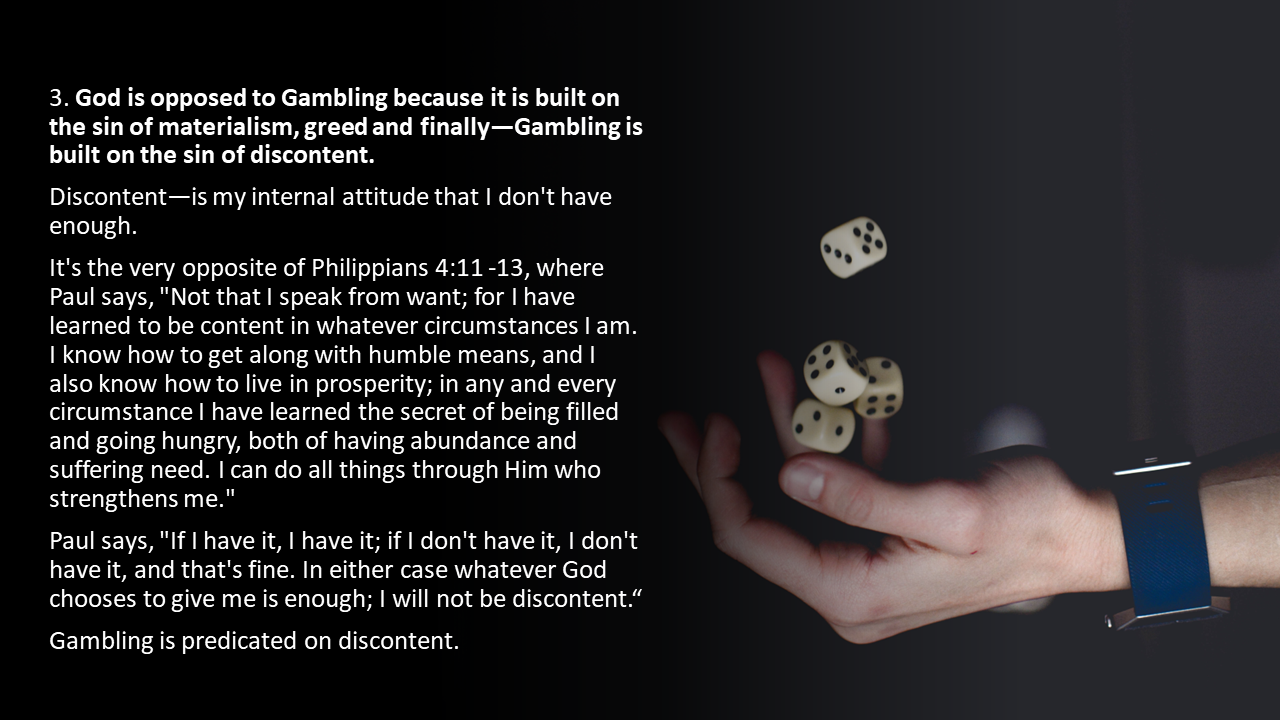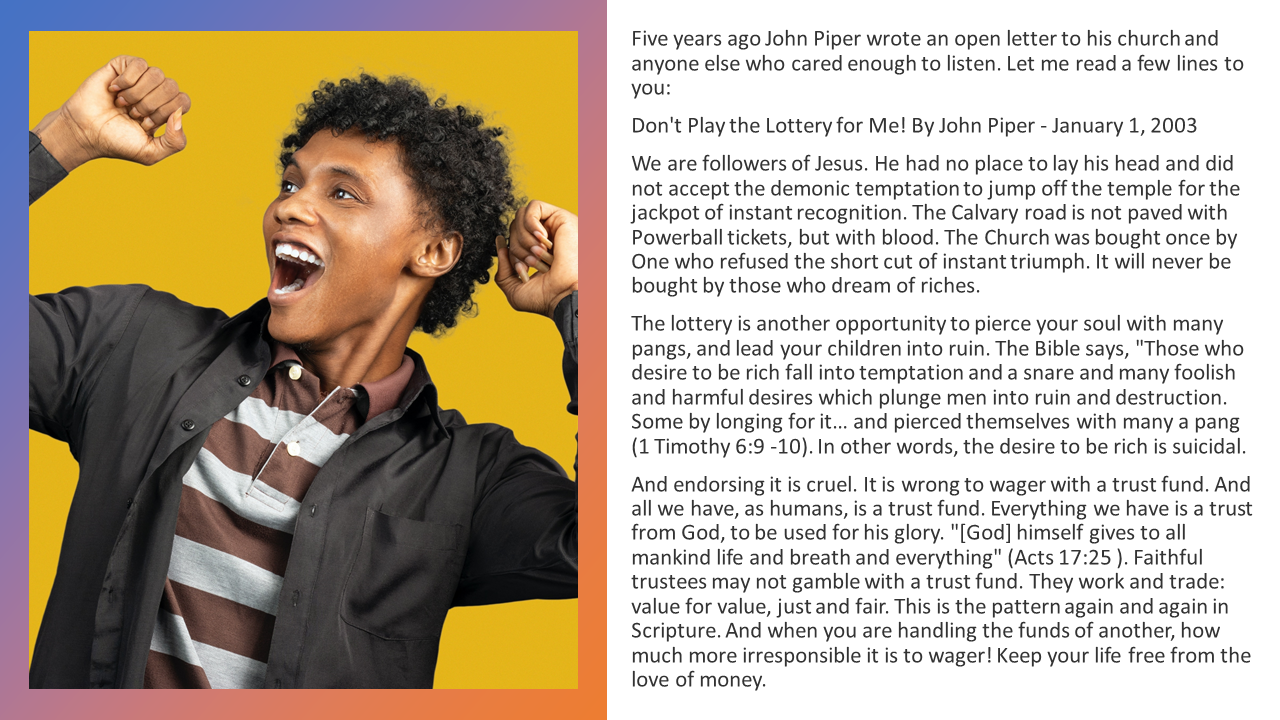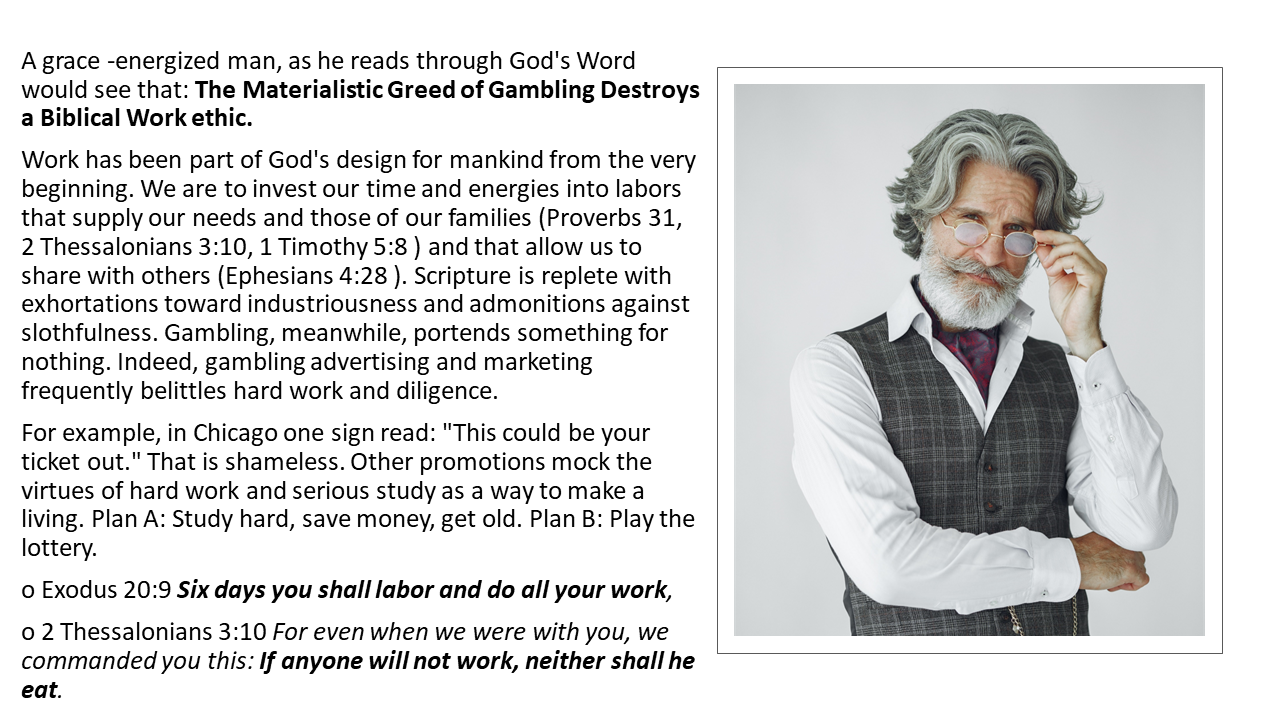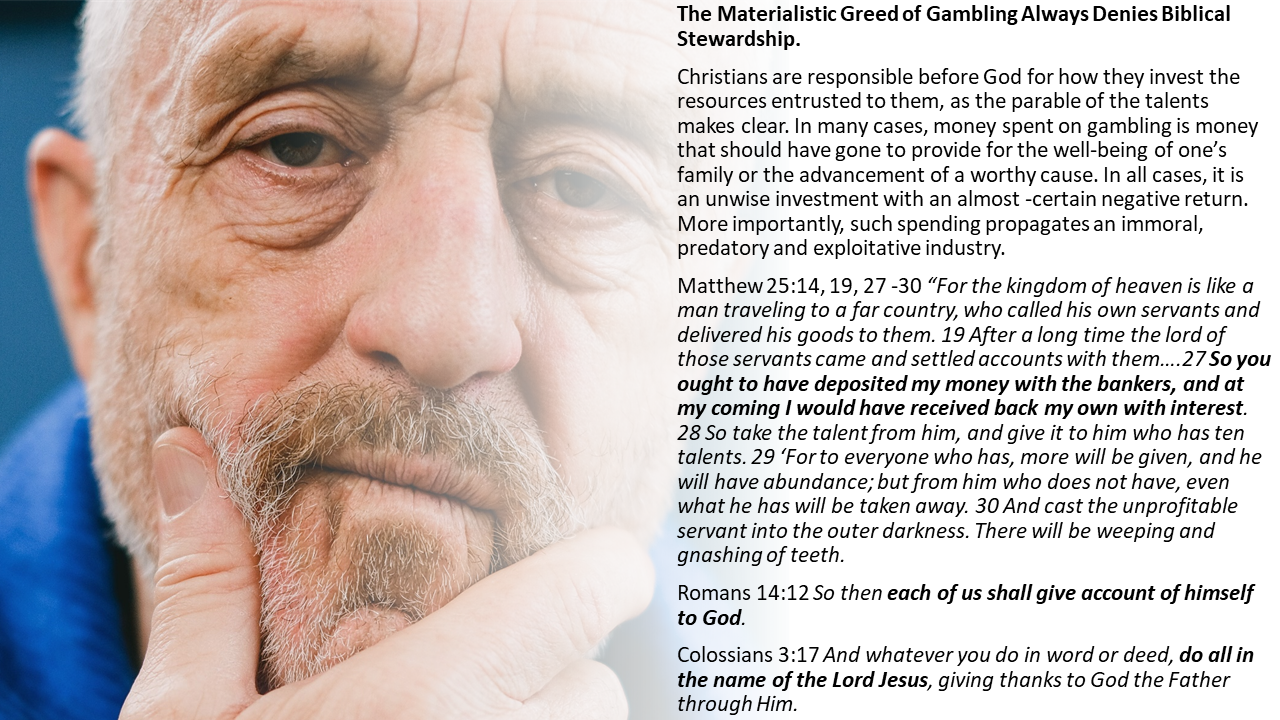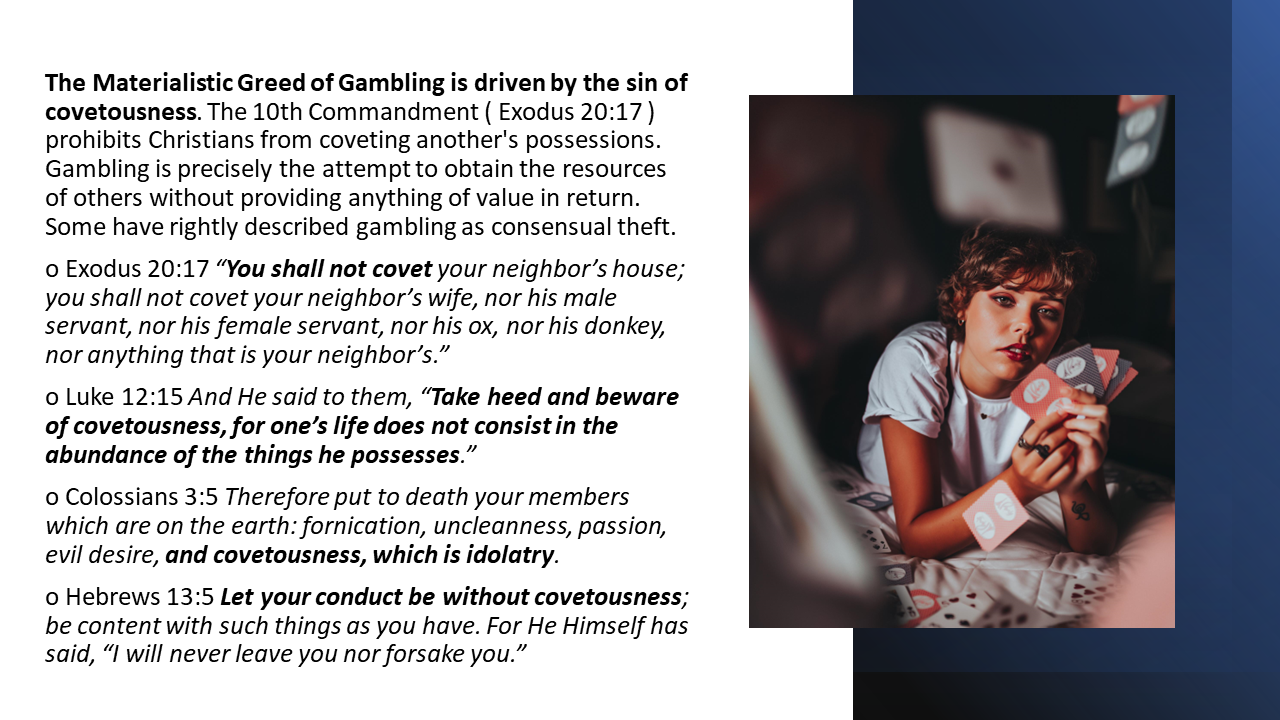GEM-12
080127AM
The Lord has revealed His convictions very clearly in His Word. God is Pro-Life, Pro-Marriage, Pro-Justice, and Pro-Work.
We then defined those convictions as the Bible does, that God is:
- GOD is Pro-Life—God is opposed to Abortion and Euthanasia.
- GOD is Pro-Marriage—God is opposed to Gay Unions, as well as divorce, adultery, fornication, homosexuality, lesbianism, pornography, and every other form of immorality.
- GOD is Pro-Justice—God is opposed to murder, violence, discrimination, prejudice, and abuse of the weak, poor, and unborn; He invented capital punishment, and commands societies to have a just legal system.
- GOD is Pro-Work—God is against indolence, sloth, unbiblical entitlements, oppression of the poor by the rich, and every form of false hope produced by gambling and lotteries.
We are going to look at how a grace-energized man develops his convictions from God’s Word. Each day we all have to live and work in a world so much like the world of the First Century. When the aged Paul sat to write his young disciple named Titus, his days like ours were full of both false teachings about God, and wrong behavior among the believers.
As Paul sat to write perhaps the clearest words on how to live a life governed by Biblical convictions in Titus 2 —it was sometime between a.d. 62–64. Paul was serving the churches of Greece (ancient Macedonia), after his release from his first prison time in Rome; and before his final Roman imprisonment.
Paul had to live and serve under an Empire that swarmed with citizens, slaves, and commercialism. Rome and all its blatant materialism reigned over nearly the entire known world of Paul’s day.
How were Christians to live in the world of the New Testament? That question was especially vital to believers in the culture of Rome—rife with greed, gambling, and constant oppression of the poor.
Paul sits down to write to that very challenge the saints faced as they also had to live, work, and vote. For times just like those in which we live Paul writes, Christ’s church is to be filled with…
Men Sound in “The” Faith
Our look at the fourth element of a grace-energized disciple of Christ as described in Titus 2—men who are sound in faith, could never be more timely.
Titus 2:1-2 But as for you, speak the things which are proper for sound doctrine: 2 that the older men be sober, reverent, temperate,sound in faith, in love, in patience; NKJV
God’s discipleship program for men was laid down for Christ’s church right from the earliest days. It was focused upon guarding healthy faith—in this crooked and perverse world.
“Sound in faith” means knowing how to apply God’s Word to issues of living for God in an ungodly world. Which is just another way of saying…
Living with Biblical Convictions—
as a Citizen of Heaven still living on Earth
Paul had already described the goal of discipleship in Colossians 1:10. As we remind ourselves of this passage—let God speak to your heart. Be sure that all of your life is open to His working so that every part may please Him, bear fruit for Him, and produce good works for His glory.
“So that you may walk in a manner worthy of the Lord, to please [Him] in all respects, bearing fruit in every good work and increasing in the knowledge of God.” Colossians 1:10 (NASB)
Paul considered every area of life to be on the pathway to becoming pleasing to Christ. Discipleship produces a mature Christian disciple, who has been deeply touched by Christ in every aspect of his life. Mature disciples bear fruit and overflow with good works.
Discipleship is to touch All of our Life
Remember God is Pro-work. Do you share His convictions?
Do you believe and practice His conviction against: indolence, sloth, unbiblical entitlements, oppression of the poor by the rich, and every form of false hope produced by gambling and lotteries?
True teachers of God’s Word have always sought to share God’s revealed convictions. On our topic this morning Saint Augustine once said, “The devil invented gambling.” John Calvin outlawed gambling in the entire city ofGeneva. Martin Luther said, “Money won by gambling is not won without self-seeking and sin.”
But never has the availability to gamble been more pervasive than it is today.
America has become a nation selling hope for money. Tragically that money in exchange for hope is taken from people who can not afford to buy it. The hope offered by gambling and lotteries is unreal, impossible, and destructive. “
Lotteries, like drug addiction and drunkenness, offer what only God can give freely!” (John Piper)
America, it’s fair to say, is wild about gambling. In 1962, American place about $2 billion in bets. By the year 2000, that number had grown to $866 billion. And now, the country is headed for a staggering trillion dollars a year in wagers. These bets take place in over fifteen hundred casinos and other gambling places nationally; and in vast lotteries embraced by state governments as revenue godsends; and at horse tracks and dog tracks and sporting events; and on 35,000 internet sites devoted to gambling. Imagine it. Americans spend $22 billion a year on all movies, plays, concerts, live performances, and on all sports events; but nearly a trillion dollars on gambling.”[1][1]
A History of Gambling in America
How did we get so captivated by gambling? The history of gambling inAmerica is startling if you have never studied it.
America was colonized with a lottery. In 1612 the British government ran a lottery to assist the new settlement at Jamestown, Virginia. The father of our country, George Washington, wisely declared, “Gambling is the child of avarice (or greed), the brother of iniquity, and the father of mischief.” We certainly agree with George; however, he himself kept a full diary of his own winnings and losses!
America was founded as a nation upon a lottery. In 1776, the First Continental Congress of the United States sold lottery tickets to finance the American Revolution. President Washington himself bought the first lottery ticket to build the new capital called, “Federal City,” now known as Washington D. C..
Our nation was filled with gambling for over 100 years, until 1894. From[2][2] 1790 to 1894, 24 of the 36 states sponsored government run lotteries. Many schools, universities, colleges, and hundreds of churches conducted their own lotteries to raise funds for their own buildings.
So, our nation was colonized by a lottery, our War for Independence was financed by a lottery, our capital city was financed by a lottery, and our first hundred-plus years as a nation was filled with lotteries and gambling..
The Church struggled a little bit in dealing with gambling because they couldn’t point to a verse that said, “Thus saith the Lord, ‘Thy shalt not gamble.'” But they did denounce it as socially harmful and inconsistent with the biblical view of God and with a Christian’s understanding of good stewardship.
Methodists and Baptists, Puritans and Quakers began some evangelical activism and began to attack this government sponsored gambling. Under this attack, and because of the increasing corruption of the gambling, by 1894 there was no more government sponsored gambling–it ended in corruption and in a financial fiasco.
Public gambling at any level was stopped cold at that time because John Wanamaker, the Postmaster General of the United States and an evangelical, barred “all letters, parcels, postcards, circulars, lists of drawings, tickets and other materials referring to lotteries, from the mail”.
So, government sponsored gambling came to a halt for the next 70 years. In 1964 it was reintroduced by the state of New Hampshire, which became the first state to offer a lottery, and now there are only 8 states that do not have government sponsored lotteries, and only three states that do not offer casinos. There are over 1,500 casinos and other gambling places across the nation, mostly on Indian reservation land, where the government allows them to just about do anything they want to do, tax-free.
In 1974, ten years after the first lottery in NH, a Gallup poll indicated 61% of Americans gambled, wagering 47.4 billion dollars annually. In 1989, 71% were wagering $246 billion. In 1992, $330 billion was being wagered.
By 2007, studies indicate 95% of Americans gambled, 82% play the lottery, 75% play slot machines, 74% frequented casinos, 50% bet on dogs and horses, 44% on cards, 34% on bingo, 26% on sporting events; and 89% approved of gambling–that means there was 6% who didn’t approve, but gambled anyway.
God is Pro-Work
But God is Pro-Work and thus opposed to gambling. Why is God against Gambling? I believe there are three simple reasons anyone can find who looks in God’s Word.
- God is opposed to Gambling because it is built on the sin of materialism.
Materialism is measuring life by possessions. The whole appeal of gambling is that you can get rich, because you need more material things.
1Timothy 6:10, [says,] “The love of money is the root of . . .” what? Loving money leads to all kinds of evil.
“The love of money,” is just another phrase for materialism, and gambling is built on the “love of money.”
“Win money. Win money. Win money.” That s the essence of the appeal of gambling to our sinful materialistic lust.
- God is opposed to Gambling because it is built on the sin of greed.
Greed is the idea that whatever you have is not enough. Lotteries and gambling appeal to our greed with their outrageous monetary prizes. Lotteries wouldn’t be appealing without staggeringly payouts. Gambling and lotteries appeal to greed with their outrageous potential winnings, and the Bible has so much to say about greed.
Proverbs talks so repeatedly about what happens to greedy people.
Jesus talked about what happens to greedy people in Luke 12:15which says,
“Beware and be on your guard against every form of greed, for not even when one has an abundance does his life consist of his possessions.”
Jesus said, avoid greed, because even when you get what you have been greedy for, you haven’t really gotten anything.
- God is opposed to Gambling because it is built on the sin of materialism, greed and finally—Gambling is built on the sin of discontent.
Discontent—is my internal attitude that I don’t have enough.
It’s the very opposite of Philippians 4:11-13, where Paul says,
“Not that I speak from want; for I have learned to be content in whatever circumstances I am. I know how to get along with humble means, and I also know how to live in prosperity; in any and every circumstance I have learned the secret of being filled and going hungry, both of having abundance and suffering need. I can do all things through Him who strengthens me.”
Paul says, “If I have it, I have it; if I don’t have it, I don’t have it, and that’s fine. In either case whatever God chooses to give me is enough; I will not be discontent.” Gambling is predicated on discontent.
Five years ago John Piper wrote an open letter to his church and anyone else who cared enough to listen. Let me read a few lines to you:
Don’t Play the Lottery for Me!
By John Piper
January 1, 2003
We are followers of Jesus. He had no place to lay his head and did not accept the demonic temptation to jump off the temple for the jackpot of instant recognition. The Calvary road is not paved with Powerball tickets, but with blood. The Church was bought once by One who refused the short cut of instant triumph. It will never be bought by those who dream of riches.
The lottery is another opportunity to pierce your soul with many pangs, and lead your children into ruin. The Bible says, “Those who desire to be rich fall into temptation and a snare and many foolish and harmful desires which plunge men into ruin and destruction. . . . Some by longing for it . . . and pierced themselves with many a pang (1 Timothy 6:9-10). In other words, the desire to be rich is suicidal. And endorsing it is cruel.
It is wrong to wager with a trust fund. And all we have, as humans, is a trust fund. Everything we have is a trust from God, to be used for his glory. “[God] himself gives to all mankind life and breath and everything” (Acts 17:25). Faithful trustees may not gamble with a trust fund. They work and trade: value for value, just and fair. This is the pattern again and again in Scripture. And when you are handling the funds of another, how much more irresponsible it is to wager! Keep your life free from the love of money.[3][3]
Healthy Convictions are Drawn from God’s Word
A grace-energized man as he reads through God’s Word would see that:
- The Materialistic Greed of Gambling Destroys a Biblical Work ethic. Work has been part of God’s design for mankind from the very beginning. We are to invest our time and energies into labors that supply our needs and those of our families (Proverbs 31, 2 Thessalonians 3:10, 1 Timothy 5:8) and that allow us to share with others (Ephesians 4:28). Scripture is replete with exhortations toward industriousness and admonitions against slothfulness. Gambling, meanwhile, portends something for nothing. Indeed, gambling advertising and marketing frequently belittles hard work and diligence. [4][4] For example, in Chicago one sign read: “This could be your ticket out.” That is shameless. Other promotions mock the virtues of hard work and serious study as a way to make a living. Plan A: Study hard, save money, get old. Plan B: Play the lottery.[5][5]
o Exodus 20:9 Six days you shall labor and do all your work,
o 2 Thessalonians 3:10 For even when we were with you, we commanded you this: If anyone will not work, neither shall he eat.
- The Materialistic Greed of Gambling Always Denies Biblical Stewardship. Christians are responsible before God for how they invest the resources entrusted to them, as the parable of the talents makes clear. In many cases, money spent on gambling is money that should have gone to provide for the well-being of one’s family or the advancement of a worthy cause. In all cases, it is an unwise investment with an almost-certain negative return. More importantly, such spending propagates an immoral, predatory and exploitative industry[6][6].
o Matthew 25:14, 19, 27-30 “For the kingdom of heaven is like a man traveling to a far country, who called his own servants and delivered his goods to them. 19 After a long time the lord of those servants came and settled accounts with them….27 So you ought to have deposited my money with the bankers, and at my coming I would have received back my own with interest. 28 So take the talent from him, and give it to him who has ten talents. 29 ‘For to everyone who has, more will be given, and he will have abundance; but from him who does not have, even what he has will be taken away. 30 And cast the unprofitable servant into the outer darkness. There will be weeping and gnashing of teeth.
o ’Romans 14:12 So then each of us shall give account of himself to God.
o Colossians 3:17 And whatever you do in word or deed, do all in the name of the Lord Jesus, giving thanks to God the Father through Him.
- The Materialistic Greed of Gambling is driven by the sin of covetousness[7][7]. The 10th Commandment (Exodus 20:17) prohibits Christians from coveting another’s possessions. Gambling is precisely the attempt to obtain the resources of others without providing anything of value in return. Some have rightly described gambling as consensual theft. [8][8]
o Exodus 20:17 “You shall not covet your neighbor’s house; you shall not covet your neighbor’s wife, nor his male servant, nor his female servant, nor his ox, nor his donkey, nor anything that is your neighbor’s.”
o Luke 12:15 And He said to them, “Take heed and beware of covetousness, for one’s life does not consist in the abundance of the things he possesses.”
o Colossians 3:5 Therefore put to death your members which are on the earth: fornication, uncleanness, passion, evil desire,and covetousness, which is idolatry.
o Hebrews 13:5 Let your conduct be without covetousness; be content with such things as you have. For He Himself has said, “I will never leave you nor forsake you.”
A man’s life doesn’t consist in the abundance of the things he possesses.” I mean, we are warned about that repeatedly, over and over and over again. Whatever you have is what God has provided for you, and whatever you don’t have is what He hasn’t provided for you.
But gambling makes a persistent appeal to covetousness, and it is fundamentally opposed to the unselfishness, which was taught by Jesus Christ, and by the New Testament. The attempt, inseparable from gambling, to make a profit out of the inevitable loss and sufferings of others is certainly the antithesis of loving your neighbor as yourself. If we are ever going to curb gambling, we are going to have to curb covetousness—a pretty formidable task. Greed, materialism, a love of money, they flourish in a gambling environment.
Gambling, built on covetousness, is an act of unfaithfulness to God, because it assumes that God has not given us what we ought to have—he hasn’t given us enough, and it assumes that more is a good thing. Is it?
God knows you, and he knows me, and He knows what we need, and He knows what we can handle, and He knows what tests He wants to bring into our life, and He has defined the stewardship and the character of that stewardship for each of us. I don’t want yours and I hope you don’t want mine.[9][9]
Other insights are:
- The Materialistic Greed of Gambling always exploits the poor. Gambling preys on the desperation of the poor. The National Gambling Impact Study Commission found that those with incomes less than $10,000 spend more on lottery tickets than any other income group. High school dropouts spend four times as much as college graduates. Scripture exhorts us to look out for the poor and disadvantaged, and issues strong warnings against taking advantage of their plight. [10][10]
- Proverbs 14:31 He who oppresses the poor reproaches his Maker, But he who honors Him has mercy on the needy. [Lotteries reproach God!]
- Zechariah 7:10 Do not oppress the widow or the fatherless, The alien or the poor. Let none of you plan evil in his heart against his brother.’
- The Materialistic Greed of Gambling denies the love of our neighbors. Jesus commanded, “Love your neighbor as yourself” (Mark 12:31). Gambling, meanwhile, is predicated on the losses, pain, and suffering of others. For one to win at gambling, others must lose. For many, the ramifications attributable to their gambling losses are profound. Families touched by a gambling addiction are at greatly increased risk for such negative outcomes as divorce, bankruptcy, child abuse, domestic violence, crime, and suicide. More than 15 million Americans already struggle with a gambling problem, and the number continues to grow as gambling expands.
- Matthew 7:12 Therefore, whatever you want men to do to you, do also to them, for this is the Law and the Prophets.
- Philippians 2:3-4 Let nothing be done through selfish ambition or conceit, but in lowliness of mind let each esteem others better than himself. 4 Let each of you look out not only for his own interests, but also for the interests of others.
- The Materialistic Greed of Gambling always Promotes more greed. Gambling is founded on greed and under girded by a “get-rich-quick” appeal. In a recent national poll, two-thirds of respondents stated that the reason they gamble is to win money. [11][11]
o Proverbs 15:27 He who is greedy for gain troubles his own house, But he who hates bribes will live.
o 1 Timothy 6:9-10 But those who desire to be rich fall into temptation and a snare, and into many foolish and harmful lusts which drown men in destruction and perdition. 10 For the love of money is a root of all kinds of evil, for which some have strayed from the faith in their greediness, and pierced themselves through with many sorrows.
APPENDIX:
Biblical Convictions start with the Bible, because—
We are Citizens of Heaven
The clearest word for us as we face on election day in the USA is when God’s Word speaks to us.
- This world is only my temporary home. Philippians 3:20 For our citizenship is in heaven, from which we also eagerly wait for the Savior, the Lord Jesus Christ,
- God rules over every part of this world. Daniel 2:20-22 Daniel answered and said: “Blessed be the name of God forever and ever, For wisdom and might are His. 21 And He changes the times and the seasons;He removes kings and raises up kings; He gives wisdom to the wise And knowledge to those who have understanding. 22 He reveals deep and secret things; He knows what is in the darkness, And light dwells with Him.
- God selects the rulers of this world. Daniel 4:17, 25, 32, 34-35-35 —17 ‘This decision is by the decree of the watchers, And the sentence by the word of the holy ones, In order that the living may know That the Most High rules in the kingdom of men, Gives it to whomever He will, And sets over it the lowest of men.’ 25 They shall drive you from men, your dwelling shall be with the beasts of the field, and they shall make you eat grass like oxen. They shall wet you with the dew of heaven, and seven times shall pass over you, till you know that the Most High rules in the kingdom of men, and gives it to whomever He chooses. 32 And they shall drive you from men, and your dwelling shall be with the beasts of the field. They shall make you eat grass like oxen; and seven times shall pass over you, until you know that the Most High rules in the kingdom of men, and gives it to whomever He chooses.” 34 And at the end of the time I, Nebuchadnezzar, lifted my eyes to heaven, and my understanding returned to me; and I blessed the Most High and praised and honored Him who lives forever: For His dominion is an everlasting dominion, And His kingdom is from generation to generation. 35 All the inhabitants of the earth are reputed as nothing; He does according to His will in the army of heaven And among the inhabitants of the earth. No one can restrain His hand Or say to Him, “What have You done?”
- God allows the rulers of this world to continue in power. Daniel 5:18-23 O king, the Most High God gave Nebuchadnezzar your father a kingdom and majesty, glory and honor. 19 And because of the majesty that He gave him, all peoples, nations, and languages trembled and feared before him. Whomever he wished, he executed; whomever he wished, he kept alive; whomever he wished, he set up; and whomever he wished, he put down. 20 But when his heart was lifted up, and his spirit was hardened in pride, he was deposed from his kingly throne, and they took his glory from him. 21 Then he was driven from the sons of men, his heart was made like the beasts, and his dwelling was with the wild donkeys. They fed him with grass like oxen, and his body was wet with the dew of heaven, till he knew that the Most High God rules in the kingdom of men, and appoints over it whomever He chooses. 22 “But you his son, Belshazzar, have not humbled your heart, although you knew all this. 23 And you have lifted yourself up against the Lord of heaven. They have brought the vessels of His house before you, and you and your lords, your wives and your concubines, have drunk wine from them. And you have praised the gods of silver and gold, bronze and iron, wood and stone, which do not see or hear or know; and the God who holds your breath in His hand and owns all your ways, you have not glorified.
- God gives them any temporary success rulers may have for a purpose within His plan. Psalm 75:6-7 For exaltation comes neither from the east Nor from the west nor from the south. 7 But God is the Judge: He puts down one, And exalts another.
- God picks the rulers by His standards. Jeremiah 27:5, 8 ‘I have made the earth, the man and the beast that are on the ground, by My great power and by My outstretched arm, and have given it to whom it seemed proper to Me. 8 And it shall be, that the nation and kingdom which will not serve Nebuchadnezzar the king of Babylon, and which will not put its neck under the yoke of the king of Babylon, that nation I will punish,’ says the Lord, ‘with the sword, the famine, and the pestilence, until I have consumed them by his hand.
- God allows rulers to do what is perceived by us as evil (crucifying Jesus) to accomplish the larger purposes of God (the redemption of sinners). John 19:11 Jesus answered, “You could have no power at all against Me unless it had been given you from above. Therefore the one who delivered Me to you has the greater sin.”
- God tells us our primary responsibility is to PRAY, that is how we influence the outcome of any current political situation. 1 Timothy 2:1-3 Therefore I exhort first of all that supplications, prayers, intercessions, and giving of thanks be made for all men, 2 for kings and all who are in authority, that we may lead a quiet and peaceable life in all godliness and reverence. 3 For this is good and acceptable in the sight of God our Savior,
- God tells us the outcome in advance. Revelation 1:5 and from Jesus Christ, the faithful witness, the firstborn from the dead, and the ruler over the kings of the earth. To Him who loved us and washed us from our sins in His own blood,
My Conviction—Be a Daniel
The challenge of our new century in which we live is to bring leaders of great moral conviction to the forefront of our nations government without the baggage of moral imposition. The greatest example of this is in the trio of great politicians from three of the greatest empires of ancient history. These men are so great they are known by their first names: Joseph of Egypt, Daniel of Babylon, and Nehemiah of Persia. Each of these men was of unwavering Biblical integrity. Each of these men had convictions they would stand for, suffer for, and even go to death for. But none of them ever imposed by way of legislation, those convictions upon those they governed.
There is a revealed civil code God laid down after the flood – human government in Genesis 9. It is basically restated in the 2nd half of the Law of Moses (commandments 5-10) and is known in one way or another around the world. Basic laws against murder, theft, lying, and so on make up the laws for mankind’s good. But these statesmen – Joseph, Daniel, and Nehemiah, did not impose all the rest of the religious laws of Israel upon society.
One of the great needs of American governance is to see men who can be trusted as men of integrity, yet who will not be seeking to impose morals upon the citizens that are not the black and white clearly written laws of God for SOCIETY. The clear laws are against murder of the born and unborn, sodomy and all other clearly described sexual perversions, and witchcraft, which is always linked to drug abuse in the Bible. The rest of the areas of society such as blue laws, alcohol, gambling, lotteries, and so on, are not part of the laws of society, they are for the individual not the society. They are matters of personal conviction, not of government imposition.
If we can have deeply religious leaders who are not bringing their convictions to bear on other individuals through policies, laws, and legislation, then the character of government will be less partisan, the people will be more open to the persuasion of those individuals who live out their personal convictions, and government will not get confused with the church.
[1][1] The Business of Gambling: Testing America’s Luck Aired: Wednesday, September 18, 2002 http://www.onpointradio.org/shows/2002/09/20020918_b_main.asp
[2][2] Drawn from Didier Sornette Why Stock Markets Crash: Critical Events in Complex Financial SystemsPrinceton, Princeton University Press, 2003 (421 pp). ISBN 0-69109-630-9 (Google Book, online edition) .
[3][3] John Piper, Don’t Play the Lottery for me, January 1, 2003.
[4][4] These points drawn from Focus on the Family atwww.family.org/cforum/research/papers/a0008570.html
[5][5] John Piper, Don’t Play the Lottery for me, January 1, 2003.
[6][6] These points drawn from Focus on the Family atwww.family.org/cforum/research/papers/a0008570.html
[7][7] This point is drawn from a transcript of a message preached by John MacArthur, “Gambling” in 1997.
[8][8] These points drawn from Focus on the Family atwww.family.org/cforum/research/papers/a0008570.html
[9][9] This point is drawn from a transcript of a message preached by John MacArthur, “Gambling” in 1997.
[10][10] These points drawn from Focus on the Family atwww.family.org/cforum/research/papers/a0008570.html
[11][11] These points drawn from Focus on the Family atwww.family.org/cforum/research/papers/a0008570.html

